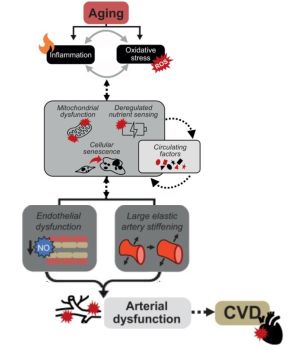Causes of death by rate
Causes of death by rate




Leading causes of death are always ranked in relationship to one another. This means the rank of a specific cause may change even if its mortality rate has not changed. On the other hand, the ranking can remain the same even if its mortality rate increases or decreases.

Cardiovascular diseases (CVD), principally ischemic heart disease (IHD) and stroke, are the leading cause of death worldwide, and their incidence continues to increase as a result of changes in lifestyle and the increase in average lifespan.[6][7][8][9][10]
Previous studies reported that in Europe alone around 4 million people die of CVD every year, accounting for 44% of all deaths.[11][12] Heart disease has remained the leading cause of death at the global level for the last 20 years. However, it is now killing more people than ever before. The number of deaths from heart disease increased by more than 2 million since 2000, to nearly 9 million in 2019. Men are more likely than women to die from heart disease.
References
- ↑ Quinlan, R. A., & Clark, J. I. (2022). Insights into the biochemical and biophysical mechanisms mediating the longevity of the transparent optics of the eye lens. Journal of Biological Chemistry, 102537. PMID: 36174677 PMC9638808 DOI: 10.1016/j.jbc.2022.102537
- ↑ Li, Z., Yao, F., Yu, P., Li, D., Zhang, M., Mao, L., ... & Zhou, B. (2022). Postnatal state transition of cardiomyocyte as a primary step in heart maturation. Protein & Cell, 13(11), 842. PMID: 35394262 PMC9237199 DOI: 10.1007/s13238-022-00908-4
- ↑ Tembely, D., Henry, A., Vanalderwiert, L., Toussaint, K., Bennasroune, A., Blaise, S., ... & Maurice, P. (2022). The Elastin Receptor Complex: An Emerging Therapeutic Target against Age-Related Vascular Diseases. Frontiers in Endocrinology, 13. PMID: 35222273 PMC8873114 DOI: 10.3389/fendo.2022.815356
- ↑ Li, K. N., & Tumbar, T. (2021). Hair follicle stem cells as a skin‐organizing signaling center during adult homeostasis. The EMBO Journal, 40(11), e107135. PMID: 33880808 PMCID: PMC8167365 DOI: 10.15252/embj.2020107135
- ↑ Murray, K. O., Mahoney, S. A., Venkatasubramanian, R., Seals, D. R., & Clayton, Z. S. (2023). Aging, aerobic exercise, and cardiovascular health: Barriers, alternative strategies and future directions. Experimental gerontology, 173, 112105.PMID: 36731386 PMC:10068966 DOI: 10.1016/j.exger.2023.112105
- ↑ Tsao, C. W., Aday, A. W., Almarzooq, Z. I., Anderson, C. A., Arora, P., Avery, C. L., ... & American Heart Association Council on Epidemiology and Prevention Statistics Committee and Stroke Statistics Subcommittee. (2023). Heart disease and stroke statistics—2023 update: a report from the American Heart Association. Circulation, 147(8), e93-e621. https://doi.org/10.1161/CIR.0000000000001123
- ↑ Vos, T., Lim, S. S., Abbafati, C., Abbas, K. M., Abbasi, M., Abbasifard, M., ... & Bhutta, Z. A. (2020). Global burden of 369 diseases and injuries in 204 countries and territories, 1990–2019: a systematic analysis for the Global Burden of Disease Study 2019. The Lancet, 396(10258), 1204-1222. https://doi.org/10.1016/S0140-6736(20)30925-9
- ↑ World Health Organization (2023). Cardiovascular diseases. https://www.who.int/health-topics/cardiovascular-diseases#tab=tab_1.
- ↑ Roth, G. A., Mensah, G. A., Johnson, C. O., Addolorato, G., Ammirati, E., Baddour, L. M., ... & GBD-NHLBI-JACC Global Burden of Cardiovascular Diseases Writing Group. (2020). Global burden of cardiovascular diseases and risk factors, 1990–2019: update from the GBD 2019 study. Journal of the American College of Cardiology, 76(25), 2982-3021. https://doi.org/10.1016/j.jacc.2020.11.010
- ↑ Roth, G. A., Mensah, G. A., & Fuster, V. (2020). The global burden of cardiovascular diseases and risks: a compass for global action. Journal of the American College of Cardiology, 76(25), 2980-2981. https://doi.org/10.1016/j.jacc.2020.11.021
- ↑ Townsend, N., Kazakiewicz, D., Lucy Wright, F., Timmis, A., Huculeci, R., Torbica, A., ... & Vardas, P. (2022). Epidemiology of cardiovascular disease in Europe. Nature Reviews Cardiology, 19(2), 133-143. PMID: 34497402 DOI: 10.1038/s41569-021-00607-3
- ↑ Emmons-Bell, S., Johnson, C., & Roth, G. (2022). Prevalence, incidence and survival of heart failure: A systematic review. Heart, 108(17), 1351-1360. PMID: 35042750 PMCID: PMC9380485 DOI: 10.1136/heartjnl-2021-320131
- Temsah, M. H., Jamal, A., Aljamaan, F., Al-Tawfiq, J. A., & Al-Eyadhy, A. (2023). ChatGPT-4 and the global burden of disease study: advancing personalized healthcare through artificial intelligence in clinical and translational medicine. Cureus, 15(5).
- Li, Y., Cao, G. Y., Jing, W. Z., Liu, J., & Liu, M. (2023). Global trends and regional differences in incidence and mortality of cardiovascular disease, 1990− 2019: findings from 2019 global burden of disease study. European Journal of Preventive Cardiology, 30(3), 276-286.
- Ammar, A., Trabelsi, K., Hermassi, S., Kolahi, A. A., Mansournia, M., Jahrami, H., ... & Bragazzi, N. (2023). Global disease burden attributed to low physical activity in 204 countries and territories from 1990 to 2019: Insights from the Global Burden of Disease 2019 Study. Biology of Sport, 40(3), 835-855.
- Sleeman, K. E., De Brito, M., Etkind, S., Nkhoma, K., Guo, P., Higginson, I. J., ... & Harding, R. (2019). The escalating global burden of serious health-related suffering: projections to 2060 by world regions, age groups, and health conditions. The Lancet Global Health, 7(7), e883-e892. https://doi.org/10.1016/S2214-109X(19)30172-X
- Causes of deaths for 50- to 69-year-olds, World, 2019
- Causes of deaths for people who were 70 years and older, World, 2019

This article is currently a draft.
Material may not yet be complete, information may presently be omitted, and certain parts of the content may be subject to radical, rapid alteration. More information pertaining to this may be available on the talk page.